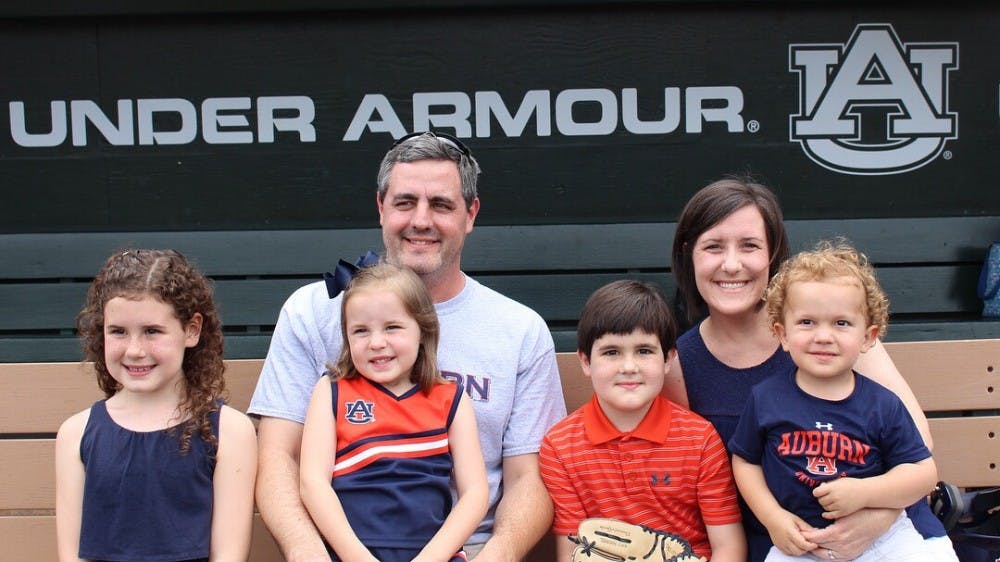“Kids didn’t do a thing, cancer just happened to them,” said Scott Parker, father of Carly Parker and 1993 Auburn alumni. “They just woke up one morning with bruises, and it turned out to be leukemia.”
At age 7, Carly Parker was diagnosed with Mesenchymal Chondrosarcoma, a rare form of cancer that settled into her sinus cavity.
“When we took her to the hospital for the first time, we looked at each other and said, ‘Our lives are going to change forever,’ and they did,” Scott Parker said.
Like the Parkers, Amy Hendrix, mother of Camp Hendrix and 2003 Auburn alumna, said her and her family's life has been drastically altered.
“In every way childhood cancer changes the life of your family forever," Hendrix said. "It’s not a separate category that only enters your life for periodic visits to the hospital.”
Camp was diagnosed with Acute Lymphoblastic Leukemia at age 5 and has undergone three and a half years of chemotherapy.
“I’m thankful for his sake that he was born with a natural strength and resilience,” she said. "It’s helped him endure a lot of physical pain that comes with cancer."
Resilience is a word often used to describe kids with cancer as they race to defy the odds.
“We would always see the kids on the cancer floor at the hospital,” Scott Parker said. "The bald ones are the strong ones – you can tell. We’d always say, ‘That little guy there with no hair, he can do anything.’”
Wyatt Bess was diagnosed with stage-four Neuroblastoma just before his third birthday in August 2016. His mother, Joshlyn Bess, a 2009 Auburn alumnus, said his cancer was aggressive.
“Childhood cancer is not the sweet picture we all see on TV with cute bald babies and smiles,” said David Bess, Wyatt Bess’ father and 2009 Auburn alumni. “It can be a very physically painful and deforming experience for the children.
“The sweet smiles from the innocent faces are rare, but when they do occur, they present a glimmer of hope and relief.”
While the battle against cancer may only last two years for some, many others will have to fight until the end, Scott Parker said.
His daughter, Carly Parker, underwent heavy chemo treatment, which was the protocol for her form of cancer.
“Do you know how it’s going to affect a child?" Scott Parker asked. "The answer is: if we don’t hit it, it’s going to take her.”
“When kids do survive cancer, they have to survive the after life of cancer,” he said.
As a result of her treatments, Carly Parker only measured to 4'11" and 90 pounds at age 17.
This highlights a glaring problem — that treatment for childhood cancer cannot be the same as treatment for adults.
McKenzie Ray, 16, was diagnosed on May 4, 2013, with High-Risk Acute Lymphoblastic Leukemia and has since relapsed six times.
As a result of receiving extensive and harsh treatments, she is faced with undeserved consequences.
Her mother, Keisha Ray, said she now fights to “overcome significant health problems created by the drugs that were used to help her beat cancer.”
“More than 95 percent of childhood cancer survivors will have a significant health-related issue by the time they are 45 years of age,” the National Pediatric Cancer Foundation said.
“The drugs their little bodies have to be exposed to is truly horrific,” David Bess said. “Because of lack of awareness and funding, there has been relatively little development in the treatment options available.”
“Since 1980, fewer than 10 drugs have been developed for use in children with cancer,” the National Childhood Cancer Foundation said.
This is largely due to the fact that only 4 percent of federal cancer research funding is contributed to pediatric cancer.
Pediatric cancer is “about watching my daughter have a ventilator breathe for her over seven times in the past five years,” Keisha Ray said. It’s about babies and teenagers fighting for their lives, and watching families lose their children.
After her 10-year battle, Carly Parker passed away on Dec. 14, 2017.
“It’s still a mourning process where my wife and I miss her every day, but it’s almost like she’s off to college,” Scott Parker said. “We’ll see something and say, ‘Carly would have loved this’ – and we’ll always do that.”
On March 14, 2017, Wyatt Bess passed away.
"[As a] mother or father, there is nothing you can do except pray to God and have faith that this is a temporary life and that one day this kind of experience will be nonexistent,” David Bess said.
While we will always remember the children who have passed, we must also look forward in advancements to cure pediatric cancer for the thousands of others.
It remains the leading cause of death by disease in children with 175,000 new diagnoses worldwide each year.
“Spread the word that they just need a better chance, [and] give them a little bit more funding and more attention,” Scott Parker said.
To raise awareness and help support the cause, Auburn students can learn more or become involved with organizations like Open Hands Overflowing Hearts, Children’s Hospital of Alabama and Smile-A-Mile.
“One thing about pediatric cancer is the cancer is the same, but the patient is different,” Scott Parker said. "Together we will work to not only cure pediatric cancer, but to find a cure that isn’t harmful for their future."
Do you like this story? The Plainsman doesn't accept money from tuition or student fees, and we don't charge a subscription fee. But you can donate to support The Plainsman.





